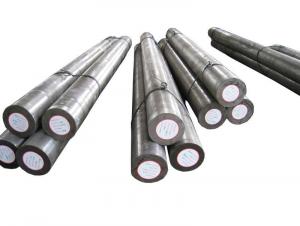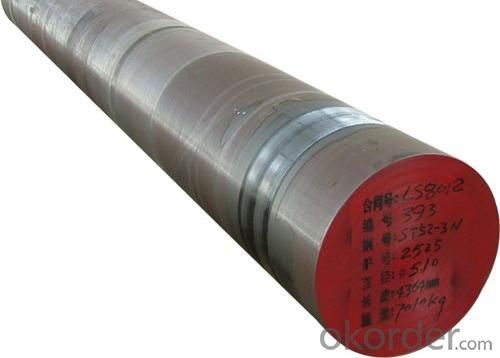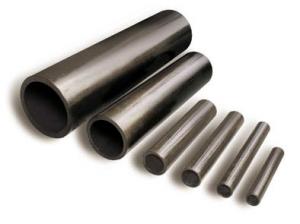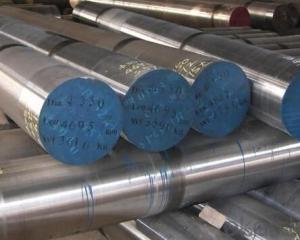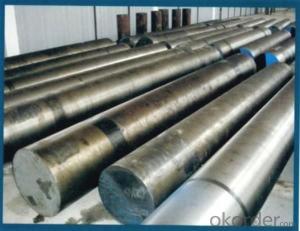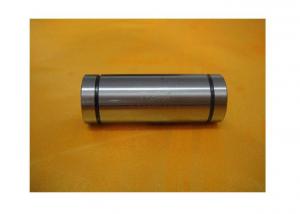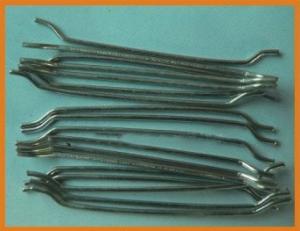High Quality Bearing Steel
- Loading Port:
- Guangzhou
- Payment Terms:
- TT or LC
- Min Order Qty:
- 25MT m.t.
- Supply Capability:
- 600000 Tons/Year m.t./month
OKorder Service Pledge
OKorder Financial Service
You Might Also Like
Specifications of High Quality Bearing Steel
|
Grade |
bearing steel EN-31 |
|
Dimensions |
Diameter: 20-280mm Length: 2000-5800mm |
|
Shape |
Round Bar |
|
Type |
High chromium bearing steel |
|
HBS |
<220 |
|
Standard |
AISI |
|
Technique |
Hot Rolled |
Usage and Applications of High Quality Bearing Steel
High Quality Bearing steel is used for manufacturing ball, roller bearing steel and rings. Bearing in work is under great pressure and friction, so have high demands bearing steel and hardness and resistance, and high elastic limit.
Bearing steels are used for ball and roller bearing applications and are comprised of low carbon steels and high carbon through harden able steel.
For example, bearing ring, steel rolling mill, machinery, 100Cr6 bearing steel ball is widely used in high-speed and low-noise bearing, bicycle, motorcycle, automobile, bags electronically.
Packaging & Delivery of High Quality Bearing Steel
Packaging Detail: Standard seaworthy packing or as customer required.
Delivery Detail: 45 days
Trade terms: FOB, CFR, CIF
MOQ: 25 tons or at customer's demands
We have some characteristics as below:
1. High quality
2. Competitive price
3. On-time delivery
4. Excellent after-sales service
5. Large stocks
Chemical Composition of High Quality Bearing Steel
|
C |
S |
P |
Si |
Mn |
|
0.95-1.05 |
≤0.025 |
≤0.025 |
0.15-0.35 |
0.25-0.45 |
|
Cr |
Mo |
Ni |
Cu |
Ni+Cu |
|
1.40-1.65 |
≤0.10 |
≤0.30 |
≤0.25 |
≤0.50 |
Note of High Quality Bearing Steel
1. According to national standard (GB) for our products, if not, supply according to national standards (GB) or agreement.
2. We can not only provide electric furnace +LF+VD and electros lag re-melting (ESR) steel forging materials, but also forging products of piece, bar, etc.
3. Our company is equipped with roll equipment and can provide our customers with roll billets or finished.
4. The materials that we purchase are all accord with International General Standard; you could check it out on the Material Quality Sheet.
5. We are the creator of the “seven-step inspect method” in China.
6. The technical workers we employed are the ones with many years’ working experience, who know the technology procedures very well.
7. We will strictly inspect our production that we sold according to the customer’s request.
8. Our steel reaches international quality standards. Besides, our company is equipped with large-sized vertical saw machines, horizontal saw machines, milling machines, grinding machines and other advanced equipment. All our products are carried out hardness tests, such as the ultrasonic flaw detection before shipment. Therefore, there is no quality problem. With more competitive price than other suppliers, our steel has good sales in the markets of North America, South America, East Europe, Southeast Asia, Africa, Oceania, the Middle East, East Asia and West Europe.
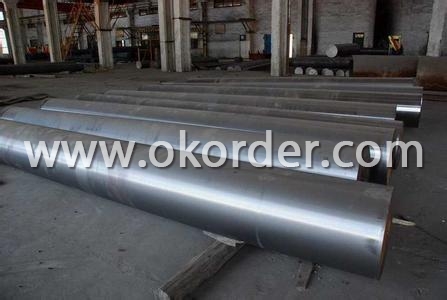
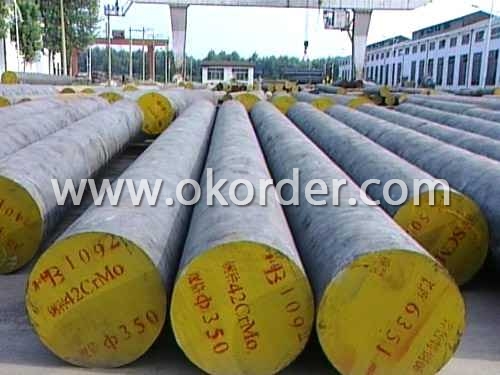
- Q: What are the properties of carbon steel?
- Carbon steel is a type of steel that primarily consists of iron and carbon, with trace amounts of other elements. It is known for its strength, durability, and high melting point. Carbon steel is also highly malleable, making it easy to form into various shapes and structures. Additionally, it exhibits good corrosion resistance, although it is not as resistant as stainless steel. Overall, carbon steel is widely used in industries such as construction, automotive, and manufacturing due to its excellent mechanical properties.
- Q: What is the life cycle of special steel products?
- The life cycle of special steel products typically involves several stages, including raw material extraction, steel production, manufacturing of specialized products, distribution and sales, usage by consumers, and finally, end-of-life disposal or recycling. This life cycle ensures that the special steel products go through various processes and stages before reaching the hands of the end-users.
- Q: What are the different methods of preventing pitting corrosion in special steel?
- There are several methods available to prevent pitting corrosion in special steel. These techniques aim to protect the steel surface from the corrosive environment and inhibit the formation of pits. Some of the commonly used methods include: 1. Passivation: Passivation involves treating the steel surface with a chemical solution or coating to create a protective oxide layer. This layer acts as a barrier, preventing the penetration of corrosive agents and reducing the risk of pitting corrosion. 2. Alloying: By adding specific alloying elements to the steel composition, its resistance to corrosion can be improved. Elements such as chromium, nickel, and molybdenum are often used as they enhance the steel's ability to form a stable passive film and resist pitting corrosion. 3. Cathodic protection: This method involves using a sacrificial anode or applying an impressed current to the steel surface. By making the steel cathodic, it becomes less susceptible to corrosion as electrons are drawn away from it, preventing the formation of pits. 4. Coatings: Applying a protective coating to the steel surface can effectively prevent pitting corrosion. Coatings such as paint, epoxy, or polymer-based materials act as a physical barrier, shielding the steel from corrosive agents. 5. Environmental control: Controlling the environment surrounding the steel can also help prevent pitting corrosion. This includes measures such as regulating temperature, humidity, and pH levels to ensure they are within acceptable limits and inhibiting the corrosion process. 6. Regular maintenance: Regular inspection and maintenance of the steel surface are crucial for preventing pitting corrosion. Any signs of damage or deterioration should be addressed promptly to prevent further corrosion and potential pitting. It is important to note that the choice of prevention method depends on various factors such as the specific steel composition, the corrosive environment, and the intended application. Proper selection and implementation of these methods can significantly enhance the resistance of special steel to pitting corrosion, ensuring its longevity and performance.
- Q: What are the properties of wear-resistant steel?
- Wear-resistant steel possesses several key properties that make it highly effective in withstanding wear and abrasion. These properties include high hardness, excellent toughness, good strength, and resistance to impact and fatigue. It also exhibits a low coefficient of friction, which reduces the frictional forces acting on the material, thereby minimizing wear. Additionally, wear-resistant steel is often characterized by high corrosion resistance, ensuring its durability in harsh environments. Overall, these properties make wear-resistant steel a reliable and long-lasting material for applications where wear and abrasion are significant concerns.
- Q: What are the different mechanical properties of special steel?
- Special steels have a variety of mechanical properties that make them unique and suitable for specific applications. Some of the key mechanical properties of special steel include high strength, excellent toughness, good wear resistance, and superior corrosion resistance. High strength is one of the most important properties of special steel. It allows the material to withstand heavy loads and stress without deformation or failure. This property makes special steel suitable for applications where structural integrity and durability are critical, such as in the construction of buildings, bridges, and machinery. Another significant mechanical property of special steel is its toughness. Toughness refers to the ability of a material to absorb energy and resist fracture under impact or sudden loads. Special steels with high toughness are essential for applications that involve dynamic and high-impact forces, such as in the manufacturing of tools, gears, and machinery components. Wear resistance is another important mechanical property of special steel. It refers to the ability of a material to resist damage and deterioration due to friction, abrasion, or erosion. Special steel with good wear resistance is commonly used in applications where it will be subjected to harsh conditions or repetitive mechanical actions, such as in the production of cutting tools, dies, and molds. Superior corrosion resistance is a valuable mechanical property of special steel, especially in environments where exposure to moisture, chemicals, or extreme temperatures is likely. Special steels with high corrosion resistance can withstand the deteriorating effects of oxidation, rust, and chemical reactions, making them suitable for applications in industries such as marine, chemical, and oil and gas. In summary, special steels possess a range of mechanical properties that set them apart from conventional steels. High strength, excellent toughness, good wear resistance, and superior corrosion resistance are some of the key mechanical properties that make special steel a preferred choice for various industrial applications.
- Q: How does special steel perform in high-velocity impact conditions?
- Special steel is specifically designed to perform well in high-velocity impact conditions. It possesses exceptional strength and toughness, allowing it to withstand the intense forces exerted during such impacts. The unique composition and heat treatment of special steel enable it to absorb and distribute the energy generated by the impact, minimizing deformation and potential damage. Overall, special steel demonstrates excellent performance and reliability in high-velocity impact conditions.
- Q: What are the different electrical grades of special steel?
- There are several electrical grades of special steel that are specifically designed to have superior electrical properties. These grades include: 1. Electrical Silicon Steel: This grade of special steel contains a high percentage of silicon, typically around 3-4%. The presence of silicon helps to minimize eddy current losses and improve the magnetic properties of the steel, making it ideal for use in electrical transformers and motors. 2. Electrical Stainless Steel: This grade of special steel is made from stainless steel alloys, which are known for their excellent corrosion resistance. The electrical stainless steel has a low electrical resistivity and high thermal conductivity, making it suitable for electrical connectors, terminals, and other components that require good electrical conductivity and resistance to oxidation. 3. Electrical Tool Steel: Tool steels are commonly used in the manufacturing of various tools and dies. Some tool steels are specifically formulated to have improved electrical properties, including high electrical conductivity and resistance to heat. These grades are often used in the production of electrical contacts, switches, and other electrical components that require high wear resistance and good electrical performance. 4. Electrical Copper-Clad Steel: This grade of special steel is made by bonding a layer of copper to a steel core. The copper layer provides excellent electrical conductivity, while the steel core provides strength and durability. Electrical copper-clad steel is commonly used in applications where high electrical conductivity is required, such as in power transmission lines and grounding systems. Overall, the different electrical grades of special steel offer a range of electrical properties to meet the specific needs of various electrical applications. These grades are carefully engineered to provide optimal electrical performance, durability, and resistance to corrosion and wear.
- Q: What are the main factors affecting the creep rupture strength of special steel?
- The main factors affecting the creep rupture strength of special steel are the material composition, grain size, temperature, applied stress, and time.
- Q: What are some innovative applications of special steel?
- The distinct properties and characteristics of special steel, also known as alloy steel, enable it to be utilized in a wide range of innovative applications. Some of these applications include: 1. Aerospace Industry: The aerospace industry extensively employs special steel for the production of critical components such as turbine blades, landing gears, and structural parts. Its exceptional strength, excellent corrosion resistance, and ability to withstand extreme temperatures make it an optimal choice for these applications. 2. Automotive Industry: Various applications in the automotive industry benefit from special steel, including the manufacture of engine components, suspension systems, and safety-related parts. Its remarkable strength-to-weight ratio and resistance to wear and fatigue ensure enhanced performance, durability, and safety in vehicles. 3. Medical Devices: Special steel finds use in the manufacturing of surgical instruments, implants, and medical equipment. Its biocompatibility, high strength, and corrosion resistance make it suitable for implant use in artificial joints, stents, and dental implants. 4. Energy Sector: The energy sector heavily relies on special steel, particularly in power plants, nuclear reactors, and oil and gas facilities. Special steel pipes and tubes are employed for fluid and gas conveyance, while its ability to withstand high temperatures is crucial for components like steam turbines and boilers. 5. Tooling and Machining: Special steel is extensively utilized in tooling and machining processes due to its exceptional hardness, toughness, and wear resistance. Its application in the production of cutting tools, dies, molds, and machine components ensures precision, extended tool life, and increased productivity. 6. Defense and Security: The defense and security sectors utilize special steel for the production of armored vehicles, ballistic protection, and military-grade equipment. Its capacity to withstand high impact and offer superior protection against projectiles and explosions make it an indispensable material for these applications. 7. Construction and Infrastructure: Special steel is widely employed in the construction industry for applications such as bridges, high-rise buildings, and infrastructure projects. Its high tensile strength, corrosion resistance, and durability ensure structural integrity and safety. 8. Renewable Energy: Special steel is employed in the renewable energy sector, particularly in wind turbines and solar energy systems. Its high strength and resistance to fatigue ensure the reliability and longevity of these energy generation systems. In conclusion, special steel, with its unique properties, finds numerous innovative applications across various industries. From aerospace and automotive to medical devices and renewable energy, this versatile material continues to drive advancements and meet the evolving needs of modern technology and society.
- Q: How does mold steel resist wear and erosion?
- Mold steel resists wear and erosion due to its high hardness and toughness properties. It is specifically designed to withstand the abrasive forces and friction that occur during molding processes. Additionally, mold steel is often heat-treated to further enhance its resistance against wear and erosion, making it a durable and long-lasting material for mold manufacturing.
1. Manufacturer Overview
| Location | Guangdong, China |
| Year Established | 2005 |
| Annual Output Value | Above US$ 100 Million |
| Main Markets | korea, India, Malaysia, Brazil, Germany, Belgium, Middle East |
| Company Certifications |
2. Manufacturer Certificates
| a) Certification Name | |
| Range | |
| Reference | |
| Validity Period |
3. Manufacturer Capability
| a) Trade Capacity | |
| Nearest Port | Guangzhou |
| Export Percentage | 50%-80% |
| No.of Employees in Trade Department | 21-100 People |
| Language Spoken: | English; Chinese |
| b) Factory Information | |
| Factory Size: | 23,000 square meters |
| No. of Production Lines | 1 |
| Contract Manufacturing | OEM servise offered |
| Product Price Range | high; average |
Send your message to us
High Quality Bearing Steel
- Loading Port:
- Guangzhou
- Payment Terms:
- TT or LC
- Min Order Qty:
- 25MT m.t.
- Supply Capability:
- 600000 Tons/Year m.t./month
OKorder Service Pledge
OKorder Financial Service
Similar products
Hot products
Hot Searches
Related keywords


